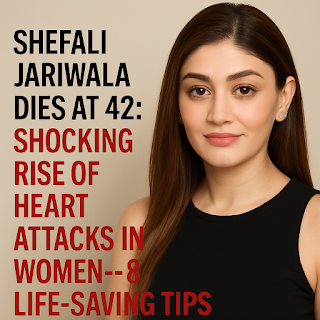Shefali Jariwala Dies at 42: Shocking Rise of Heart Attacks in Women – 6 Life-Saving Tips
Popular actress and model Shefali Jariwala, known for her appearance in Bigg Boss 13 and the hit song Kaanta Laga, tragically passed away on June 27, 2025, at the age of 42 due to a cardiac arrest. She was rushed to Bellevue Multispeciality Hospital in Mumbai, but was declared dead on arrival.
Her sudden demise has once again brought attention to a growing health crisis: heart disease in women. Medical experts are warning that heart attacks in women are often more dangerous than in men and commonly go undiagnosed due to subtle or different symptoms.
Why Heart Disease Is a Silent Killer in Women
Did you know heart disease is the number one cause of death among women worldwide?
According to a study published in PubMed Central, heart disease causes 1 in every 3 deaths among women in the U.S. In India too, cardiovascular diseases are the leading cause of death for women, even surpassing cancers.
Cardiologist Dr. Rudradev Pandey explains:
-
Heart attacks kill 10 times more women than breast cancer.
-
Over 18.69% of Indian women aged 15–49 suffer from untreated high blood pressure, a key heart disease risk factor.
-
Urban women are at even higher risk, with 21.73% affected.
He emphasizes the need for early screening and lifestyle changes to prevent heart disease in women.
8 Facts Every Woman Should Know About Heart Disease
As per Dr. Dmitry Yaranov (via Instagram), here are eight key facts women must understand:
-
Heart disease isn't just a "man's problem"—it’s equally deadly for women.
-
Symptoms differ in women—look out for nausea, dizziness, fatigue, and shortness of breath, not just chest pain.
-
Women are more likely to die within a year after a heart attack.
-
Artery blockages show up differently, making diagnosis harder in women.
-
Stress and emotional health have a stronger impact on women’s heart health.
-
Menopause increases risk due to a drop in estrogen levels.
-
Women get fewer life-saving treatments like CPR or stents.
-
Good news—most heart diseases are preventable with lifestyle changes.
6 Lifestyle Changes Women Should Start Today
Here are six important steps, recommended by experts, to reduce the risk of heart disease:
1. Eat a Heart-Healthy Diet
Include:
-
Fruits, vegetables, whole grains, nuts
Avoid: -
Saturated fats, junk food, sugary drinks
2. Exercise Regularly
Aim for at least 150 minutes a week of moderate physical activity like walking, cycling, or dancing.
3. Manage Stress
Chronic stress increases heart risk. Practice:
-
Yoga
-
Meditation
-
Deep breathing techniques
4. Quit Smoking
Smoking damages blood vessels and increases heart disease risk. Seek help if needed to stop.
5. Limit Alcohol
Alcohol affects blood pressure and liver. Keep consumption minimal or avoid it completely.
6. Control Chronic Illnesses
If you have diabetes, high BP, or cholesterol, manage it through:
-
Medication
-
Diet
-
Regular check-ups
FAQs About Heart Disease in Women
Q1: Can young women get heart disease?
Yes. While age increases risk, even women in their 30s and 40s can suffer heart attacks due to poor lifestyle or untreated conditions.
Q2: What are early signs of a heart attack in women?
Signs may include:
-
Shortness of breath
-
Nausea
-
Extreme fatigue
-
Dizziness
-
Pain in back, jaw, or upper stomach
Q3: Are heart diseases more fatal for women?
Yes. Women are often misdiagnosed or receive delayed treatment, making heart attacks more fatal.
Q4: How often should women get their heart checked?
After age 30, a routine check-up every year is recommended. Those with family history should start earlier.
Conclusion
The unfortunate passing of Shefali Jariwala is a wake-up call for all women. Cardiovascular disease is not gender-specific, and prevention starts with awareness, lifestyle changes, and regular check-ups.
Women must listen to their bodies, seek medical help when symptoms arise, and make their heart health a priority. Small steps today can save lives tomorrow.
Disclaimer
This article is intended for informational purposes only and should not be considered a substitute for medical advice, diagnosis, or treatment. Always consult your doctor or a certified healthcare professional for medical concerns.



